[orc]Recently, author & writer Aatish Tasser’s OCI card was cancelled by the Government on allegations that he concealed that his late father was of Pakistani origin while submitting the PIO application. But who exactly is an Overseas Citizen of India (OCI)? How does one apply for the OCI card? Here is an explainer.
Indian diaspora is the largest in the world. Migration due to trade, colonial rule, employment etc. at various intervals of time in the history has led to the spread of India diaspora in more than 200 + countries as per the latest data from the Ministry of External Affairs (MEA).
After the formation of India as an Independent Republic, relevant legislation was made to define who is eligible to be Indian Citizen. The Citizenship Act, 1955 lays down the provisions which determine a Citizen in India. One of the key aspects about Indian citizenship is that it does not allow for dual citizenship i.e. an individual holding citizenship of another country cannot be a citizen of India.
For a long time, there have been calls to review this, especially regarding people of Indian origin living elsewhere in the world. It was demanded that the government provide recognition and extend certain privileges to persons of Indian origin who are citizens of other countries.
Over the years, the number of Indians working abroad or migrating to other countries has increased. In-fact the latest UNO data states that India has the largest share of International migrant stock.
Efforts towards recognizing people of Indian origin.
Persons of Indian Origin (PIO Card) came into effect on 30 March 1999. This was meant for overseas Indians who or whose forefathers have migrated to another country prior to Indian Independence and was valid for a period of 15 years. After a lukewarm response to the scheme, a High-Level committee on Indian Diaspora made certain recommendations.
Based on these recommendations, the Government of India launched the ‘Overseas Citizenship of India (OCI) Scheme’ by making amendments to Citizenship Act, 1955 in 2005.
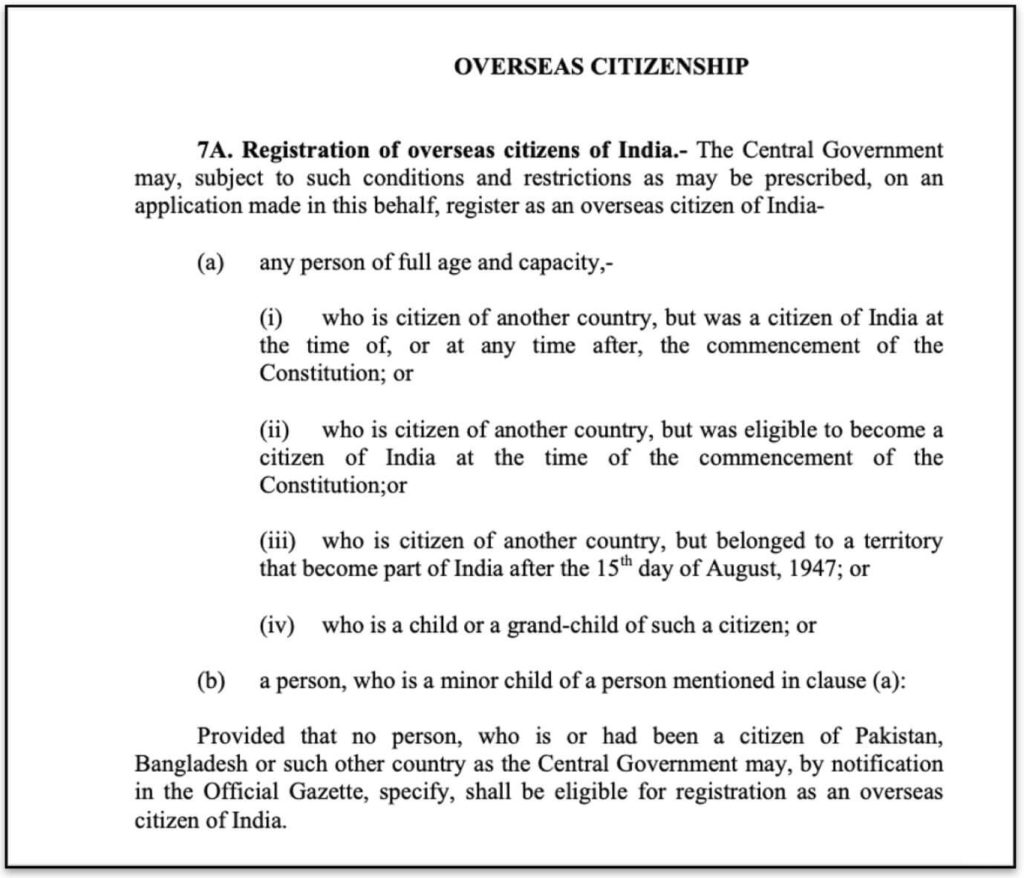
This scheme was launched during Pravasi Bharatiya Divas, held in Hyderabad in 2006.

On 09 January 2015, the Government of India discontinued the PIO card and merged it with OCI card. In other words, those who held a PIO card by that time were deemed to have OCI card.
What is OCI Card?
OCI card was introduced as a response to the multiple calls for granting dual citizenship for overseas Indians. However, since the constitution of India does not allow for dual citizenship, OCI card was introduced with certain restrictions. However, there are many benefits for persons of Indian origin who are issued an OCI Card.
Government of India allows the following categories of foreign nationals to apply for OCI Card.
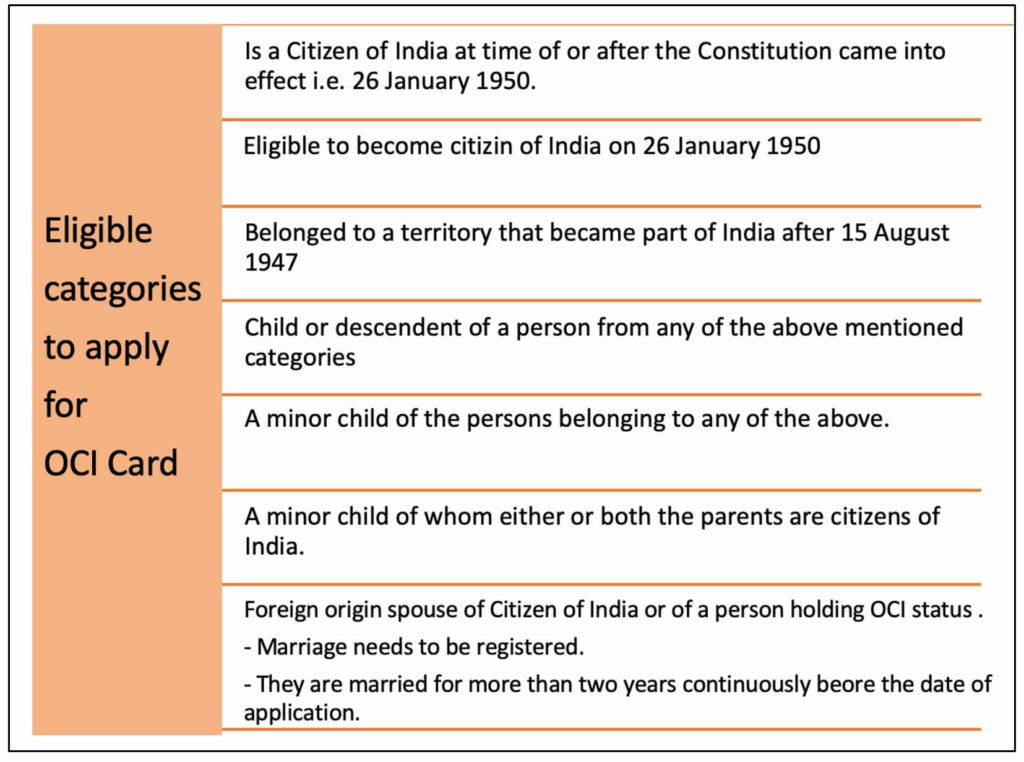
Anyone who is applying for OCI card should hold a valid Passport of another country. Individuals who do not have citizenship of any other country are not eligible to gain an OCI status. Furthermore, individuals whose parents or grandparents hold citizenship of Pakistan and Bangladesh are not eligible to apply. This may extend to other countries as notified by Government of India.
Lifelong visa with Multiple entry, any length of stay among the benefits for OCI Card Holders
The experience of the Person of Indian Origin (PIO) card scheme provided important learnings for Government of India in terms of the benefits to that can be extended to the overseas citizens, which can encourage them to be part of any such scheme.
Keeping these in mind, multiple benefits have been extended to OCI Card holders like the following.
- Lifelong Visa to visit India multiple times. (special permission needed for research work in India).
- No need to register with Foreigners Regional Registration Officer (FRRO) or Foreigners Registration Officer (FRO) for any length of stay.
- Except for acquisition of agricultural and plantation properties, OCI card holders have similar facilities that are extended to NRIs in economic, financial and educational fields.
- Same treatment as of NRIs in respect to Inter-country adoption of Indian children.
- Also treated at par with NRIs regarding – entry fees for national monuments, practice of professions like doctors, dentists, nurses, advocates, architects, Chartered Accountants & Pharmacists.
- At par with NRIs to participate in All India Pre-medical tests and such.
- Treated at par with Indian citizens in matters of traffic in airfares in Indian domestic sectors.
- Same entry fee as for Indians for entry into India’s national parks and wildlife sanctuaries.
- OCI booklet can be used as identification to avail services. An affidavit can be attached with local address as residential proof.
As OCI Card is not citizenship of India, there are certain restrictions placed on OCI card holders like the following.
- Do not have right to vote.
- Do not have right to any public service/government jobs
- Cannot hold offices of – Prime Minister, President, Vice -President, Judge of Supreme Court and High Court, member of Parliament or Member of state legislative assembly or council.
- Cannot own agricultural property.
Application for OCI card can only be done online
Applying for registration as OCI Cardholder can only be done online via the dedicated portal.
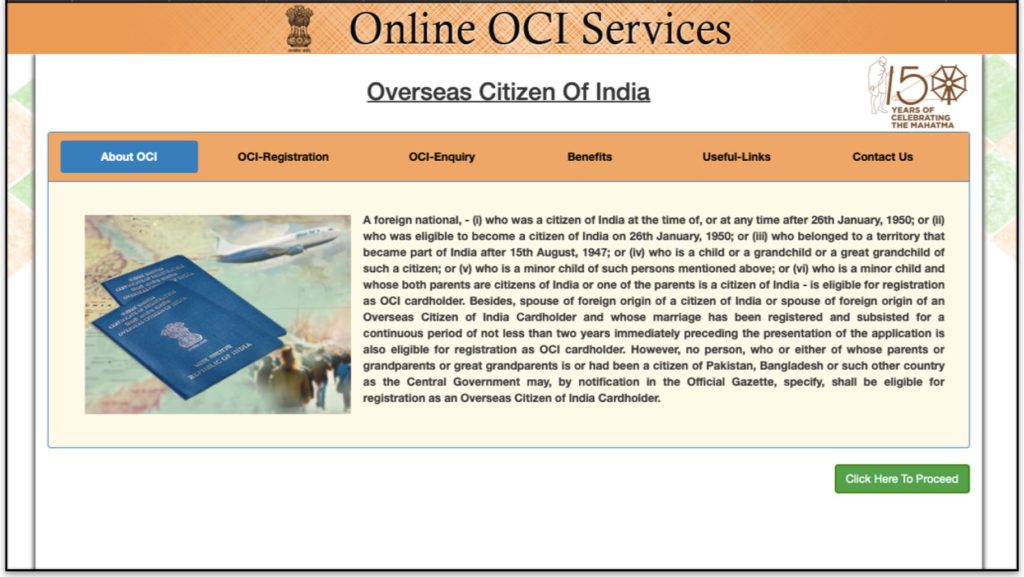
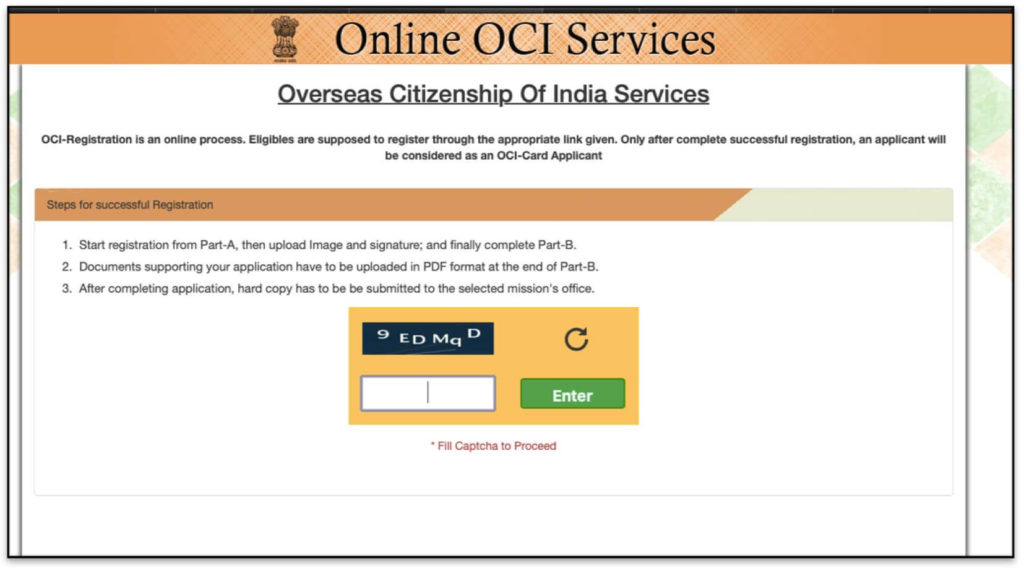
The Fresh application requires submission of the following details.
(a) Applicant’s Information
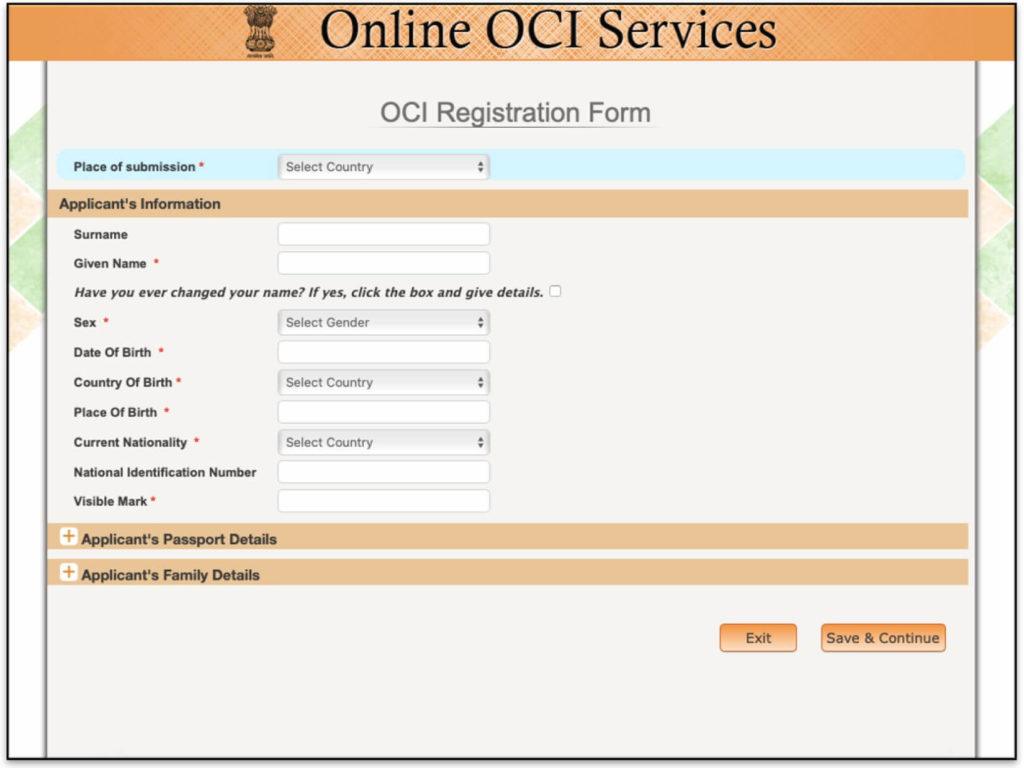
(b) Passport details

( c) Family Details
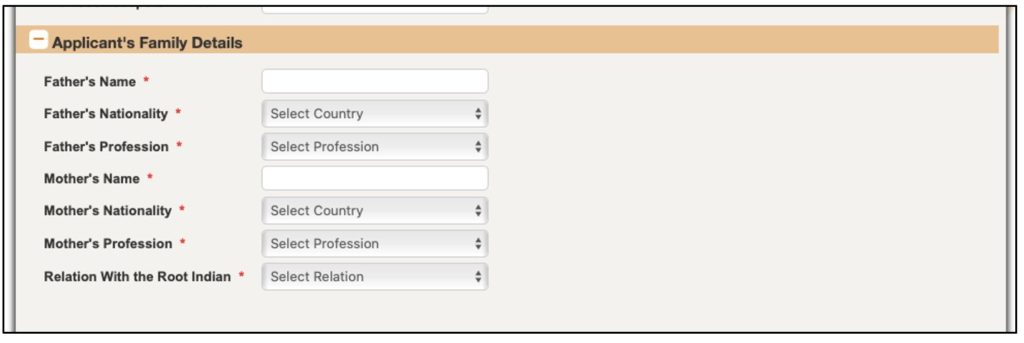
The applicant can save the application and come back later to continue the application process. A temporary application ID is provided during the initial application that can used to retrieve the saved the application.
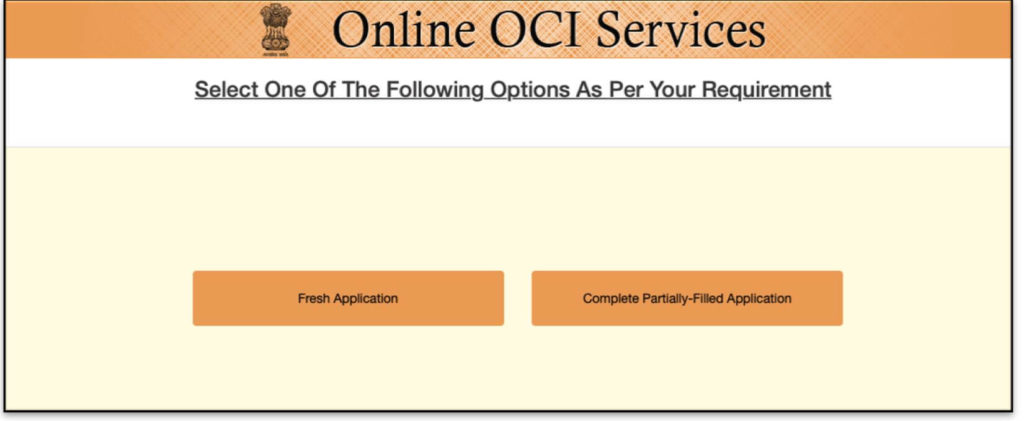
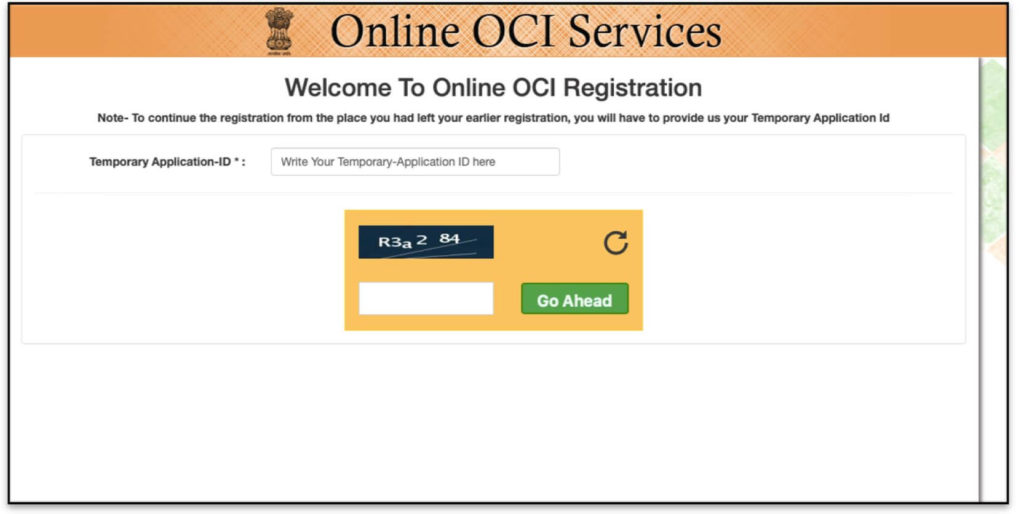
The following documents are required to be submitted along with the application.
- Proof of present citizenship i.e. copy of present passport.
- Copy of Visa in case the application is submitted in India
- Evidence of parents/grandparents being citizens of India or were eligible to be citizens. (Copy of passport, Domicile certificate, Nativity certificate, OCI /PIO Card etc.) along with the evidence of relationship.
- In case of applicant being a minor – Child’s birth certificate, passports or other aforementioned documents of parents.
- Proof of Spouse being citizen of India/OCI card holder along with marriage certificate.
The application along with the supporting documents needs to be submitted online. Post the online application, the originals of the supporting documents need to be submitted Indian Mission or FRRO for prior verification.
In case the applicant is applying from outside India, the documents are to be submitted at the following places.
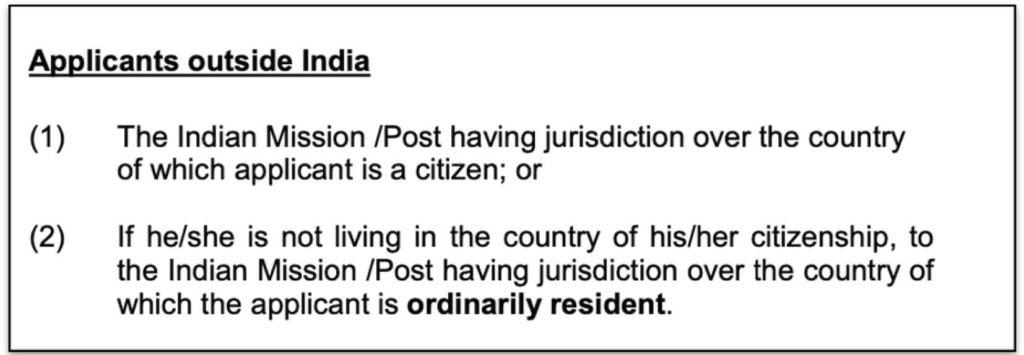
If the application is done from India, there are 13 FRROs based on the jurisdiction where these documents have to be submitted physically.
The applicants are required to pay an application fee as described below. However , currently there is no provision for online payment. Applicants can get further details on the relevant embassy’s website.
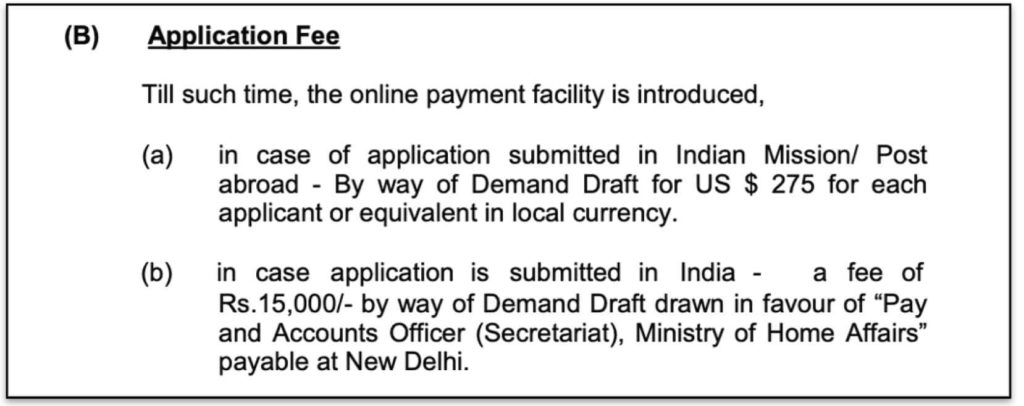
Cancellation of OCI Card
The Government of India can cancel the registration of OCI card in case any of the following criteria is met.
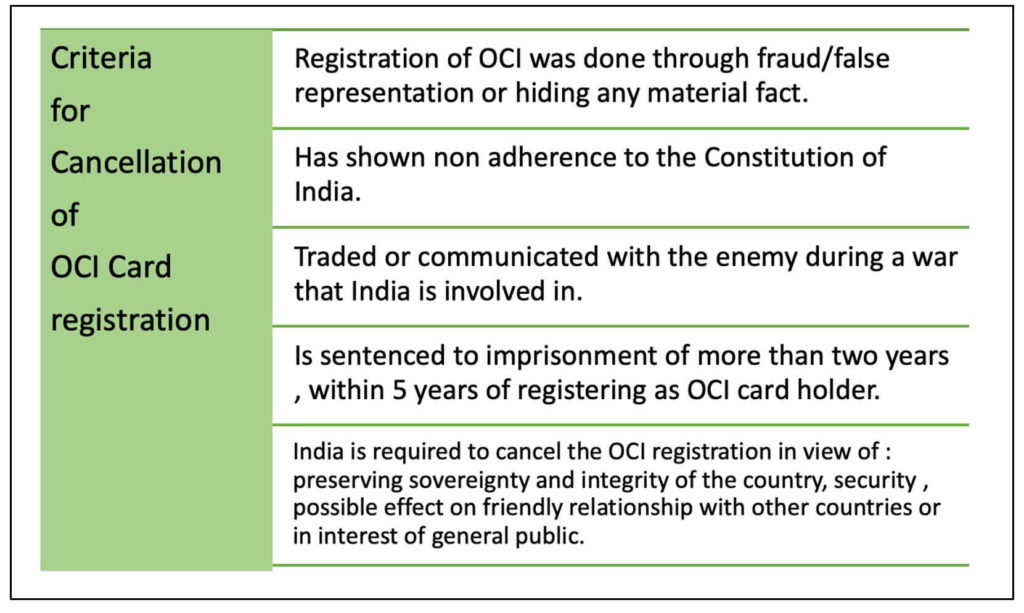
Author & writer Aatish Tasser’s OCI card was cancelled recently on allegations that he concealed that his late father was of Pakistani origin while submitting the PIO application.
USA & Malaysia have the highest number of Persons of India Origin
As per the data provided by Ministry of External Affairs, as of December 2018, there are a total of 3.09 crore (3,09,95,799) overseas Indians.
Of these, 1.31 crores ( 1,31,13,360) are NRIs , while the rest i.e. 1.78 crores ( 1,78,82,369) are People of Indian Origin. Approximately 170 countries across the globe have People of Indian Origin. USA has the highest with 31.8 lakhs, followed by Malaysia who have 27.6 lakh people of Indian Origin.
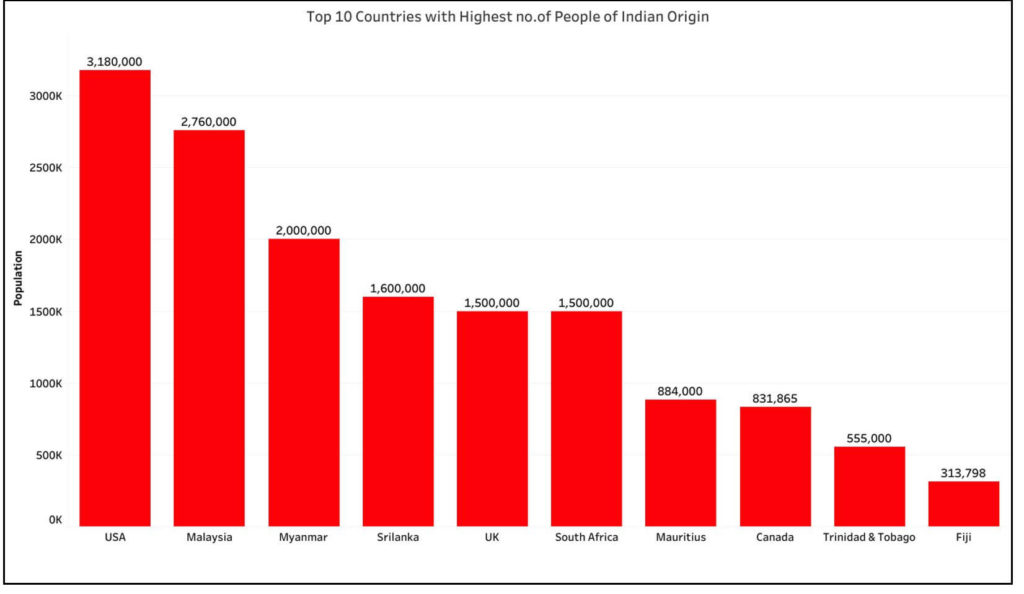
As per the data shared by the government in Lok Sabha in August 2018, more than 16 lakh OCI cards were issued in the 4-year period between 2014 & 2017.
Featured Image: OCI Card



1 Comment
Pingback: Explainer: What is an Overseas Citizen of India? How can one apply? - Fact Checking Tools | Factbase.us